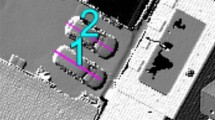Abstract
The Cropland Capture game (CCG) aims to map cultivated lands using around 170000 satellite images. The contribution of the paper is threefold: (a) we improve the quality of the CCG’s dataset, (b) we benchmark state-of-the-art algorithms designed for an aggregation of votes in a crowdsourcing-like setting and compare the results with machine learning algorithms, (c) we propose an explanation for surprisingly similar accuracy of all examined algorithms. To accomplish (a), we detect image duplicates using the perceptual hash function pHash. In addition, using a blur detection algorithm, we filter out unidentifiable images. In part (c), we suggest that if all workers are accurate, the task assignment in the dataset is highly irregular, then state-of-the-art algorithms perform on a par with Majority Voting. We increase the estimated consistency with expert opinions from 77% to 91% and up to 96% if we restrict our attention to images with more than 9 votes.
Access this chapter
Tax calculation will be finalised at checkout
Purchases are for personal use only
Similar content being viewed by others
References
Chatterjee, S., Bhattacharyya, M.: A biclustering approach for crowd judgment analysis. In: Proceedings of the Second ACM IKDD Conference on Data Sciences. pp. 118–119. ACM (2015)
Comber, A., Brunsdon, C., See, L., Fritz, S., McCallum, I.: Comparing expert and non-expert conceptualisations of the land: an analysis of crowdsourced land cover data. In: Tenbrink, T., Stell, J., Galton, A., Wood, Z. (eds.) COSIT 2013. LNCS, vol. 8116, pp. 243–260. Springer, Heidelberg (2013). doi:10.1007/978-3-319-01790-7_14
Dawid, A.P., Skene, A.M.: Maximum likelihood estimation of observer error-rates using the EM algorithm. Appl. Stat. 28, 20–28 (1979)
Dempster, A.P., et al.: Maximum likelihood from incomplete data via the EM algorithm. JRSS Ser. B 39, 1–38 (1977)
Jagabathula, S., et al.: Reputation-based worker filtering in crowdsourcing. In: Advances in Neural Information Processing Systems, pp. 2492–2500 (2014)
Karger, D.R., Oh, S., Shah, D.: Iterative learning for reliable crowdsourcing systems. In: Advances in Neural Information Processing Systems, pp. 1953–1961 (2011)
Khattak, F.K., Salleb-Aouissi, A.: Improving crowd labeling through expert evaluation. In: 2012 AAAI Spring Symposium Series (2012)
Kim, H.C., Ghahramani, Z.: Bayesian classifier combination. In: International conference on Artificial Intelligence and Statistics, pp. 619–627 (2012)
Liu, Q., Peng, J., Ihler, A.T.: Variational inference for crowdsourcing. In: Advances in Neural Information Processing Systems, pp. 692–700 (2012)
Moreno, P.G., Teh, Y.W., Perez-Cruz, F., Artés-Rodríguez, A.: Bayesian nonparametric crowdsourcing. arXiv preprint arXiv:1407.5017 (2014)
Pareek, H., Ravikumar, P.: Human boosting. In: Proceedings of the 30th International Conference on Machine Learning (ICML2013), pp. 338–346 (2013)
Raykar, V.C.: Eliminating spammers and ranking annotators for crowdsourced labeling tasks. JMLR 13, 491–518 (2012)
Raykar, V.C., et al.: Learning from crowds. J. Mach. Learn. Res. 11, 1297–1322 (2010)
Salk, C.F., Sturn, T., See, L., Fritz, S., Perger, C.: Assessing quality of volunteer crowdsourcing contributions: lessons from the cropland capture game. Int. J. Digit. Earth 9, 410–426 (2015)
See, L., et al.: Building a hybrid land cover map with crowdsourcing and geographically weighted regression. ISPRS J. Photogramm. Remote Sens. 103, 48–56 (2015)
Sheshadri, A., Lease, M.: Square: a benchmark for research on computing crowd consensus. In: First AAAI Conference on Human Computation and Crowdsourcing (2013)
Simpson, E., Roberts, S., Psorakis, I., Smith, A.: Dynamic Bayesian combination of multiple imperfect classifiers. In: Guy, T.V., Karny, M., Wolpert, D. (eds.) Decision Making and Imperfection, pp. 1–35. Springer, Heidelberg (2013)
Tong, H., Li, M., Zhang, H., Zhang, C.: Blur detection for digital images using wavelet transform. In: 2004 IEEE International Conference on Multimedia and Expo, ICME 2004, vol. 1, pp. 17–20. IEEE (2004)
Zauner, C.: Implementation and benchmarking of perceptual image hash functions. Ph.D. thesis (2010)
Zhu, X., et al.: Co-training as a human collaboration policy. In: AAAI (2011)
Acknowledgments
This research was supported by Russian Science Foundation, grant no. 14-11-00109, and the EU-FP7 funded ERC CrowdLand project, grant no. 617754.
Author information
Authors and Affiliations
Corresponding author
Editor information
Editors and Affiliations
Rights and permissions
Copyright information
© 2017 Springer International Publishing AG
About this paper
Cite this paper
Baklanov, A. et al. (2017). Vote Aggregation Techniques in the Geo-Wiki Crowdsourcing Game: A Case Study. In: Ignatov, D., et al. Analysis of Images, Social Networks and Texts. AIST 2016. Communications in Computer and Information Science, vol 661. Springer, Cham. https://doi.org/10.1007/978-3-319-52920-2_4
Download citation
DOI: https://doi.org/10.1007/978-3-319-52920-2_4
Published:
Publisher Name: Springer, Cham
Print ISBN: 978-3-319-52919-6
Online ISBN: 978-3-319-52920-2
eBook Packages: Computer ScienceComputer Science (R0)




